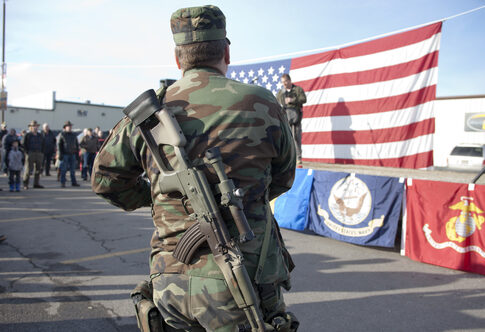Minnesota Governor Tim Walz faced a firestorm of criticism from veterans who shouted and booed him during a recent event, highlighting growing tensions over his alleged misrepresentation of military service. Walz has been accused of falsely claiming combat veteran status and misrepresenting his military rank. Evidence shows that Walz did not deploy with his battalion to Iraq, instead choosing to run for Congress. Several videos have emerged in which Walz introduces himself as a “retired command sergeant major.”
Veterans Publicly Confront Walz
Minnesota Governor Tim Walz’s recent appearance at the state Capitol turned contentious when military veterans in attendance vocally expressed their disapproval. As Walz attempted to deliver remarks about veterans’ issues and criticized Trump’s tariffs, he was met with boos and shouted interruptions from former service members. The confrontation escalated when one attendee reportedly yelled, “Shut your f*cking mouth!” The outburst reflected the growing frustration among veterans regarding allegations about Walz’s military service record.
The confrontation at the Minnesota Capitol emphasized the ongoing debate over Walz’s military service claims. Veterans in attendance expressed particular concern about “stolen valor,” which is the act of falsely claiming military achievements or experiences. This issue has followed Walz throughout his political career, but it received renewed attention after he was chosen as Kamala Harris’ running mate in the presidential election.
Tim Walz just got booed by military Veterans for his stolen valor. “You are a coward”
He soooo deserves it! pic.twitter.com/N9wsxEjhSX— Johnny Midnight
(@its_The_Dr) April 10, 2025
Credentials are in dispute
The core of the controversy centers on multiple recorded instances where Walz appears to misrepresent his military service. In a 2009 video, Walz identified himself as a “retired Command Sergeant Major” in a farewell message to soldiers deploying to Iraq. Military records indicate Walz did not complete the requirements to retire at this rank, having left service before meeting the necessary time-in-grade requirement for retirement at that level.
Further complicating Walz’s military narrative is the fact that while his National Guard unit deployed to Iraq, Walz himself did not. Instead, he chose to pursue a congressional run, leaving his unit before deployment. This decision has become a point of significant criticism, especially when contrasted with past statements where Walz has introduced himself or been introduced as a combat veteran despite never experiencing combat or being deployed to a combat zone.
#BREAKING
LOOK AT Stolen Valor Tim Walz got BOOED OUT by veterans in Minnesota today.Very rough day for tampon Tim. pic.twitter.com/J5hhGbFkQK
— L.A
♥️ (@FACTMATTER2024) April 10, 2025
Political Shenanigans
The military service debate has spread beyond veterans’ circles to become a major political liability. These discrepancies have been exploited by political opponents, particularly since Walz was named vice presidential candidate. During the latest Minnesota event, Walz attempted to discuss tariff policies and veterans’ legislation but found himself unable to complete his remarks amid growing disruptions from the audience.
Republican figures have amplified these concerns, with JD Vance among the most vocal critics of Walz’s military claims. The ongoing controversy represents a significant challenge for Walz’s credibility among military voters and veterans—a demographic traditionally valued for their high voter participation rates and community influence. The heated reception at the Minnesota Capitol demonstrates that this issue remains unresolved in the eyes of many who have served.
The Bigger Picture
The allegations against Walz occur within a larger American context in which military service is still highly valued, but claims of “stolen valor” are taken seriously by the veteran community. Military service has traditionally provided valuable credentials for political candidates, making misrepresentation especially damaging. For many veterans at the Minnesota event, the issue goes beyond partisan politics to include questions of honesty and respect for those who have served in combat roles.
Walz’s office has previously attempted to respond to these allegations by clarifying his service record, but the recent confrontation indicates that these explanations have not satisfied many in the veteran community. The incident demonstrates how military service claims can become long-term political vulnerabilities if authenticity questions are not resolved. Walz sees the hostile reception from fellow veterans as a continuing challenge to his standing among an important constituency.


